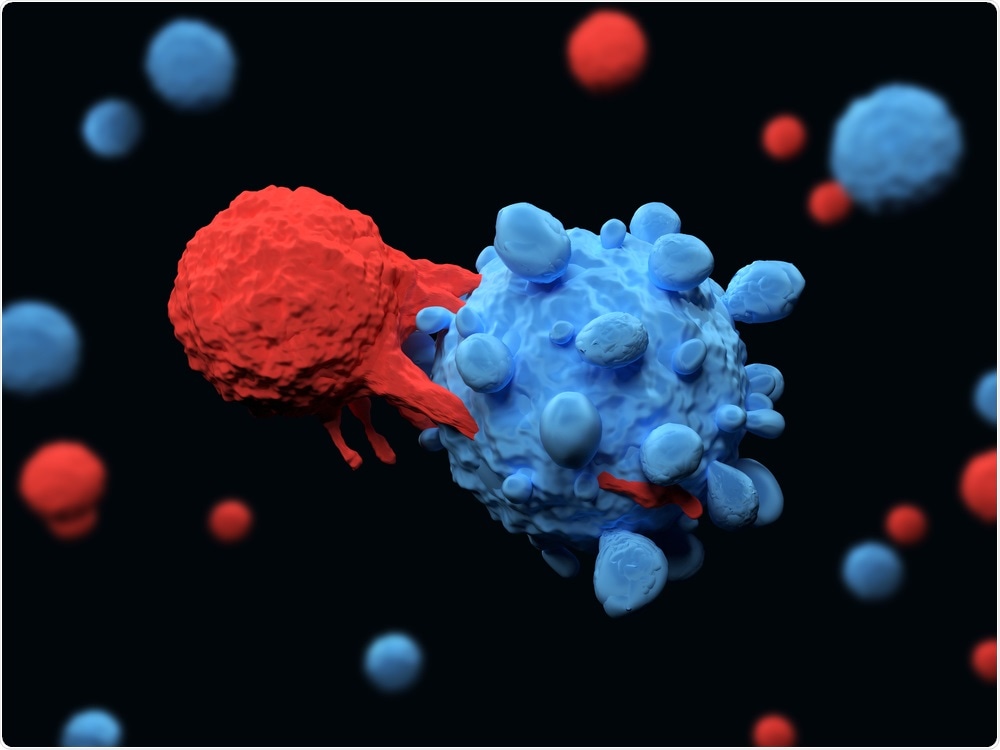The discovery that immune T cells have a spectrum of responsiveness could shed light on how our immune system responds to infections and cancer, and what goes wrong in immune diseases.

Image Credit: Meletios Verras/Shutterstock.com
Researchers at the Wellcome Sanger Institute, Open Targets, Biogen, GSK and their collaborators found that T cells responded very differently to immune signals the more 'training' they had been exposed to, rather than being a simple switch from naïve to experienced. This could help guide research into finding drug targets for immune diseases such as asthma and rheumatoid arthritis.
The study published in Nature Communications, also revealed that even highly trained memory T cells are less rigidly specialized than previously thought, and are able to respond to new immune signals. This has implications for immune research and could help understand for example how the body responds to infections.
T cells are key white blood cells that fight infection and disease and act like police directing the immune system response.
Babies are born with inexperienced - naïve - T cells, which change as they come into contact with bacteria or viruses, to create specific memory T cells that can 'remember' fighting against these infections.
These memory T cells can then react more quickly the next time they meet the same threat, telling the immune system to remove the infection rapidly. This is how vaccination protects against disease, by delivering a safe form of an invading virus or bacterium, to train our immune system by building up specific memory T cells.
Problems with T cells can result in severe immune deficiencies, leaving people susceptible to infections. Alternatively, in autoimmune diseases such as rheumatoid arthritis and type 1 diabetes, the body can mistake some of its own cells as a threat and switch on an inappropriate immune response, leading to the body attacking itself.
To better understand how memory T cells form and respond during disease, researchers took blood from healthy volunteers and analyzed their T cells.
They identified exactly which genes were switched on in each individual T cell, indicating what the cell was doing. They also tested these T cells with different immune molecules, called cytokines, to mimic how they might behave in the body.
The researchers discovered that instead of having a simple switch, from naïve to memory cell, there appeared to be a whole continuum of T cell development. They revealed that the more often a T cell had been activated by one signal, the further along the line of memory T cell development - its training' - it was, and the faster it could respond to that specific signal.
Previously people thought that memory T cells had two stages of development, but we discovered there is a whole spectrum of memory experience. From naïve T cells that have never been activated, to highly trained memory T cells which can react quickly, and many intermediate T cells in between. This spectrum not only affects how fast a cell can respond but even what signals it can respond to."
Eddie Cano Gamez, Wellcome Sanger Institute and Open Targets
The study showed the T cells also had a continuum of responsiveness to other chemical signals, revealing they were less specialized than previously thought. They found that even highly trained memory T cells could be triggered by other, new immune signals.
The researchers discovered that some signals created very different responses in memory cells, depending on their experience level. When a specific chemical signal (transforming growth factor -TGF) was added to naïve T cells, they responded by producing regulatory T cells to calm down the immune system.
However, the same chemical had the opposite effect on experienced memory cells, triggering them to release more chemicals that cause inflammation.
The collaboration between researchers at the Sanger Institute, GSK, Biogen and other Open Targets partners, will bolster the translation of these research results into new treatments.
Dr. Gosia Trynka, the senior author from the Wellcome Sanger Institute and Open Targets, said: "We were surprised to see how flexible and complex the memory T cells' response could be. Understanding this varied T cell response could help us understand our response to infections such as viruses, and also give clues to what is going wrong in immune diseases such as asthma and type 1 diabetes. By understanding the pathways involved in normal immune response, we aim to find better drug targets for developing new medicines."
Journal reference:
Cano-Gamez, E., Soskic, B., Roumeliotis, T.I. et al. Single-cell transcriptomics identifies an effectorness gradient shaping the response of CD4+ T cells to cytokines. Nat Commun 11, 1801 (2020). https://doi.org/10.1038/s41467-020-15543-y